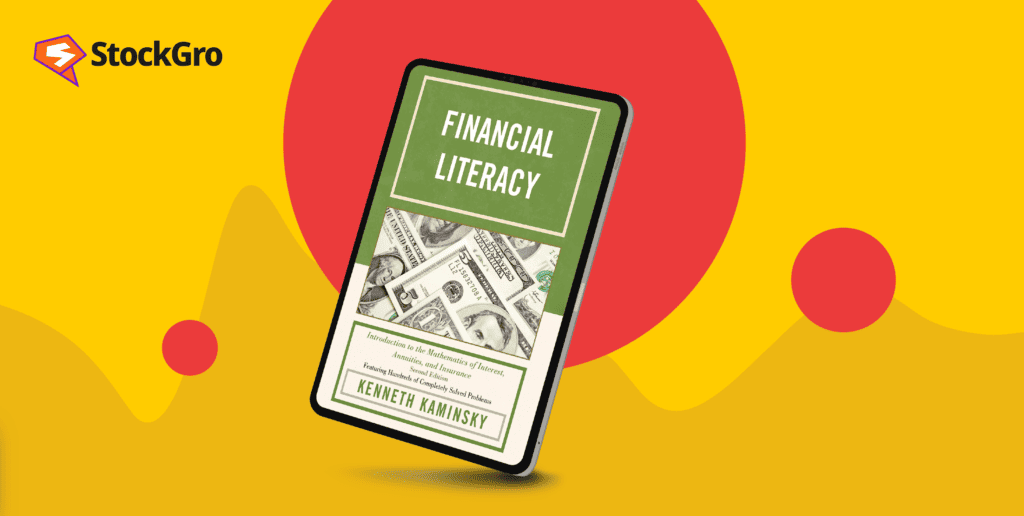
You have entered the realm of financial matters, where metrics reveal narratives and every rupee counts. But what does financial literacy mean? Simply put, financial literacy is the ability to understand and effectively use financial skills.
In today’s fast-paced world, being financially literate is no longer a luxury but a necessity. It plays a pivotal role in different sectors and demographics. Let’s embark on this journey to understand why financial literacy is the need of the hour in India.
Importance of financial literacy in India
Financial literacy is essential for economic growth, especially in a country like India, which is changing quickly and has a diverse array of individuals. It is the key to releasing the full potential of India’s huge population so that each person can make a bigger contribution to the economy.
Many people in this country still need help to use formal banking services, but learning about money can help close the gap. It can help people understand the benefits of banking services.
Being financially literate can encourage people to save and invest wisely, which can help people stay financially stable and grow the economy as a whole. Additionally, it can teach people how to avoid falling for financial scams and frauds, making the financial world safer.
Now, let’s explore how it impacts various groups, each with their unique financial challenges and opportunities.
Importance of financial literacy for farmers
Financial literacy is paramount in India’s lush fields, where farming is more than a job—it’s a way of life. The rural economy cannot function without farmers, who confront many obstacles regarding financial management.
The financial landscape can be intimidating for several reasons, including unpredictable weather patterns affecting crop yields and the complexity of loans and credits.
Acquiring financial literacy can empower farmers to conquer these obstacles. With this knowledge, they can manage their finances more responsibly, create realistic budgets, and make educated investment decisions.
They will also find it easier to understand government schemes and subsidies, which means they are more likely to benefit from the resources intended for their welfare.
Think about a Punjabi farmer for a moment. In the past, he would borrow money from local moneylenders, who would charge him ridiculous interest rates. After participating in a financial literacy programme, he can become aware of government-backed programmes that provide loans at substantially reduced rates.
With this newfound information, he can manage his finances better, allowing him to increase his investments in the farm and boost his harvest.
These anecdotes show how much of an impact financial literacy can have. For farmers in India, securing their future and paving the way for sustainable agricultural practices are more important than numbers and balance sheets. Thus, having a firm grasp of personal finance is crucial.
Importance of financial literacy for employees
Financial literacy is crucial for workers in India’s fast-paced corporate world. A steady income stream isn’t enough; you must also know how to invest it wisely.
Personal finance management and career advancement both benefit greatly from financial literacy. It teaches workers how much money they bring in and how much they spend, which helps them save money and make good budget decisions.
Understanding the financial ramifications of job changes, negotiating salaries, and making educated decisions about career opportunities are all aided by this.
Financial literacy is also important to understand investment opportunities, retirement planning, and employee benefits. Understanding and managing money allows employees to maximise their benefits, save for a secure retirement, and invest wisely.
For example, you can save a tonne of money by learning all the ins and outs of employee benefits like health insurance, provident funds, and more. Employees can diversify their portfolios and reduce financial risk by learning about different investment avenues like bonds, mutual funds, and stocks.
Also read: The concept of EPF – All you need to know about this tax-saving fund
Importance of digital financial literacy
In this day and age, the significance of managing your money digitally cannot be emphasised enough. As the country moves closer to becoming fully digital, financial services and online transactions are experiencing meteoric growth in India. Digital payment systems and online banking have given financial services a new home in the modern era.
Having a good grasp of digital financial literacy has many advantages. With its unrivalled accessibility, people can take charge of their money anywhere, anytime. Whether you’re paying bills, sending money, or investing, doing it all online is much easier and faster. The security features of digital financial platforms are second to none, further protecting our hard-earned cash.
But along with great convenience come great risks. Cybersecurity, online banking, and digital payments are complex topics, and it is critical to understand them. It’s not just about knowing how to click a button; it’s about understanding what happens when that button is clicked. It’s all about being alert to danger and prepared to avoid it.
One typical cybersecurity threat is phishing attacks, in which fraudsters attempt to trick people into divulging sensitive information. A person’s ability to recognise and respond to such risks depends on their level of digital financial literacy.
Being digitally literate in finance means more than knowing how to use digital financial services; it also means knowing how to use them safely and wisely. A solid grasp of digital financial literacy is becoming more important in India’s fast-paced digital world.
Importance of financial literacy for college students
As college students enter adulthood, they frequently acquire additional financial obligations. Managing money issues like student loans, tuition fees, and budgeting for daily costs can be challenging.
Knowing how to handle money is a very important skill for college students. They learn how to make a good budget, which helps them live within their means and save for the future. Students can make smart choices and avoid getting stuck in a debt trap if they understand their student loans, interest rates, and repayment plans.
Another important part of financial literacy is building credit. College students who know how important it is to have good credit are more likely to pay their bills on time and keep their credit history in good shape. It could help in the long run by making it easier to get loans and lowering interest rates in the future.
Learning about money also helps students prepare to be financially independent. Saving for retirement and investing in the stock market empowers them to take charge of their financial future. Responsible money management enables people to make better choices and have a more stable financial future.
Also read: Credit history: What is it and why it matters?
Importance of financial literacy for youth
Being financially literate is like having a compass that points you in the right direction for a safe and successful future. As you learn more about money, you can see that it’s not just for spending but also for making smart choices that affect the future.
Imagine being in high school and understanding the concept of compound interest or knowing the difference between a debit card and a credit card. That’s the power of early financial education. It’s like planting a seed that grows into a tree of financial wisdom, bearing fruits throughout our lives.
But managing money isn’t enough; you must also know how much money is worth. You need to understand that your monetary choices today will affect you tomorrow.
Also read: The role of compound interest to reach your financial goals
Bottomline
Emphasising the importance of financial literacy makes it clear that it is not only a skill but a lifeline in today’s complex financial world. People from all walks of life, from farmers to workers to college students to young people, can use it to help them financially.
The ability to help people make wise decisions that affect their financial future and help them become financially independent is the importance of financial literacy.
